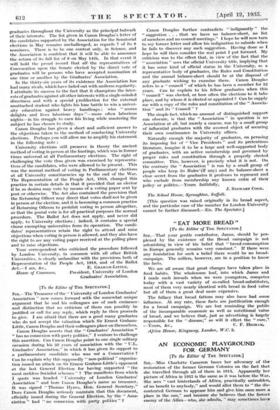[To the Editor of THE SPECTATOR.]
Sta,—The Treasurer of the " University of London Graduates' Association " now comes forward with the somewhat unique argument that he and his colleagues are of such eminence • and distinction that no criticism of them can possibly be justified or call for any reply, which reply he then proceeds to give. I am afraid that there are a good many graduates who do not accept the valuation which Sir Ernest Graham- Little, Canon Douglas and their colleagues place on themselves.
Canon Douglas asserts that the " Graduates' Association " " has no connexion with party politics." I venture to challenge this assertion. Can Canon Douglas point to one single solitary occasion during his 32 years of association with the " U.L. Graduates' Association," in which it has given its support to a parliamentary candidate who was not a Conservative ? Can he explain why this supposedly " non-political " organiza- tion issued an attack on Sir Ernest Graham-Little's opponent at the last General Election- for having supported " the most reckless Socialist schemes " ? The manifesto from which I quote was headed " University of London Graduates' Association " and bore Canon Douglas's name as treasurer. It was signed " Thomas Hynes, Hon. General Secretary." Does Canon Douglas seriously maintain that this document, officially issued during the General Election, by the " Asso- ciatkin had " no connexion with party politics " ? Canon Douglas further contradicts "indignantly " the " suggestion . . . that we have no balance-sheet, no list of members and no council meetings." I hope he will now turn to my former letter and allow his indignation to subside when he fails to discover any such suggestion. Having done so I hope he will then consider the real point I put forward. My criticism was to the effect that, in view of the fact that the " association " uses the official University title, implying that it has some kind of official status in the University, as a representative body of graduates, the Rules and Constitution and the annual balance-sheet should be at the disposal of any graduate wishing to examine them. Canon Douglas refers to a " council " of which he has been a member for 82 years. Can he explain to his fellow graduates when this " council " was elected, or how often the elections to it take place, and by whom it is elected or appointed ? Can he supply me with a copy of the rules and constitution of the " Associa- tion " and its " Council " ?
The simple fact, which no amount of distinguished support can obscure, is that the " Association " in question is no Association at all, but merely a caucus, run by a small group of influential graduates with the avowed object of securing their own continuance in University offices.
Naturally enough the majority of graduates, on perusing its imposing list of Vice Presidents " and its pretentious literature, imagine it to be a large and well-supported body of graduates, with an active membership and governed by proper rules and constitution through a properly elected committee. This, however, is precisely what it is not. On the contrary the Association " is run by a small group of people who keep its liuleiNiff any) and its balance-sheet a close secret from the •graduates it professes to represent and who exclude from membership any known critic of their policy or politics.—Yours faithfully, J. STEWART COOK.
The School House, Sproughtan, Suffolk.
[This question was raised originally in its broad aspect, and the particular case of the member for London University cannot be further discussed.—En. The Spectator.]


















































 Previous page
Previous page